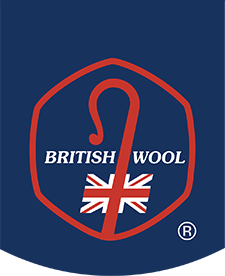A Grassroots Spotlight: four regional projects working with British Wool
British Wool has always be keen to assist and advise on regional and community-led wool projects. Working with passionate groups, individuals and brands to source farm traceable, British wool. Here are a handful of projects that we have been working with over the last six months.
Welsh Wool Company
Working closely with British Wool’s traceable wool scheme. The Welsh Wool Company is the first company to offer the fashion and textiles industries 100% traceable, Welsh wool.
With their key principles of supporting local and sustainable fashion design methods, they source traceable wool collected and graded at our Newtown Grading Depot and work with multiple manufacturers and woollen mills across Wales. This creates a supply chain that champions Welsh wool from farm to fashion.
Lake District Tweed
Lake District Tweed was set up by Cumbrian farmers Maria Benjamin and John Atkinson as part of their family farm’s diversification, whilst also supporting their local community and their neighbouring farmers.
They hope to create 13 unique tweed cloths, one for each of the 13 valleys in the Lake District national park. All using wool from farmers working and living in these valleys.
The project utilises British Wool’s high, quality assurance standards and is brought to our grading depot to be hand graded into numerous qualities to ensure consistent quality in the final cloths.
Glencroft- Clapdale Wool Project
Glencroft has a deep family history of working with wool. Established in 1987 by Richard and Justina Sexton in the village of Clapham in the Yorkshire Dales National Park, Richard had worked in the wool industry since the 1960’s and created Glencroft’s classic range British country wear using British wool, Harris Tweed, and sheepskin.
Edward Sexton now runs Glencroft and has always wanted to use wool from the sheep on the fields that surround them and to contribute directly to the farmers in his local community.
After a successful pilot project, Glencroft will source wool from a collective of farmers within a five miles radius of their home in Clapham.
Once delivered to the Bradford Grading Depot, the wool from those participating farmers goes through the grading process and then onto the scouring plant and further wool processing to be manufactured into a range of knitwear, knitting yarn and tweed products to be sold online.
Galloway and the Southern Ayrshire UNESCO Biosphere
Starting out as ‘The Wool Gathering’, this initiative was developed to promote the versatility of local wool and its potential as a sustainable resource.
Six months on, the project has won funding from the Blackface Breeders’ Association to increase the use of Blackface wool.
British Wool have helped the project source 1,000kg of Blackface wool produced within the biosphere region. The next stage will be the creation and testing of prototype outerwear garments.
Despite starting off small, these regional project are often a source of great determination and community spirit with potential for growth.
British Wool has the resources and capability to support and upscale these business and iniatives in a sustainable way. We see farm traceability as an important part of increasing the demand for British wool.





